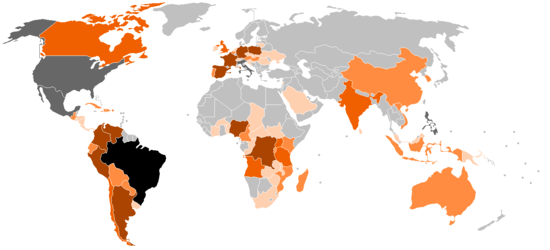Catholic Church in Austria
The Catholic Church of Austria, also known as the Roman-Catholic Church of Austria, is part of the worldwide Catholic Church in full communion with the Pope in Rome. The Church's governing body in Austria is the Austrian Conference of Catholic Bishops, made up of the hierarchy of the two archbishops (Vienna and Salzburg), the bishops and the abbot of territorial abbey of Wettingen-Mehrerau. Nevertheless, each bishop is independent in his own diocese, answerable only to the Pope. The current president of the Conference of Catholic Bishops is Cardinal Christoph Schönborn. The Austrian church is the largest Christian Confession of Austria, with 5.21 million members (59.9 % of the total Austrian population.[1]).
Since more than 50 years, however, the proportion of Catholics is decreasing, primarily due to secularization and migration (from 89 % in 1961 to 59.9 % in 2015). The number of Sunday churchgoers was around 7.3 percent (as percentage of the total Austrian population that is 623,195 churchgoers out of a total population of 8,584,926 in 2014).
Although Austria has no primate, the archbishop of Salzburg is titled Primus Germaniae (Primate of Germany).
Organisation
| Main Churches in Austria [2][1][3] | |||||||
| year | population | Catholics | % | Protestants | % | ||
|---|---|---|---|---|---|---|---|
| 1951 | 6,933,905 | 6,170,084 | 89.0 % | 429,493 | 6.2% | ||
| 1961 | 7,073,807 | 6,295,075 | 89.0 % | 438,663 | 6.2% | ||
| 1971 | 7,491,526 | 6,548,316 | 87.4 % | 447,070 | 6,0% | ||
| 1981 | 7,555,338 | 6,372,645 | 84.3 % | 423,162 | 5,6% | ||
| 1991 | 7,795,786 | 6,081,454 | 78.0 % | 338,709 | 5.0% | ||
| 2001 | 8,032,926 | 5,915,421 | 73.6 % | 376,150 | 4.7% | ||
| 2011 | 8,408,121 | 5,403,722 | 64.3 % | 319,752 | 3.8% | ||
| 2015 | 8,699,730 | 5,211,422 | 59.9% | 304,259 | 3.5% | ||
Ecclesiastical structure

- Archdiocese of Vienna with the following suffragan dioceses:
- Archdiocese of Salzburg with the following suffragans
- Territorial Abbey of Wettingen-Mehrerau (immediately subject to the Holy See)
- Military Ordinariate of Austria (immediately subject to the Holy See)
List of Catholic organisations in Austria
- Katholische Jungschar
- Katholische Jugend
Criticism
Call to Disobedience organization
The organization Call to Disobedience (Aufruf zum Ungehorsam in German) is an Austrian movement mainly composed of dissident Catholic priests which started in 2006. The movement claims the support of the majority of Austrian Catholic priests and favors ordination of women, married and non-celibate priesthood, allowing Holy Communion to remarried divorcees and non-Catholics which disagrees with teachings of the Catholic Magisterium. The group also believes the way the Church is governed needs reform.[4]
Notable people
See also
References
- 1 2 Catholic Church, Statistical Data 2003 - 2014 in German, retrieved 2 February 2016
- ↑ Austrian Population, retrieved 2 February 2016
- ↑ Lutheran Church, Statistical Data 2015 in German, retrieved 2 February 2016
- ↑ The Catholic Tipping Point

